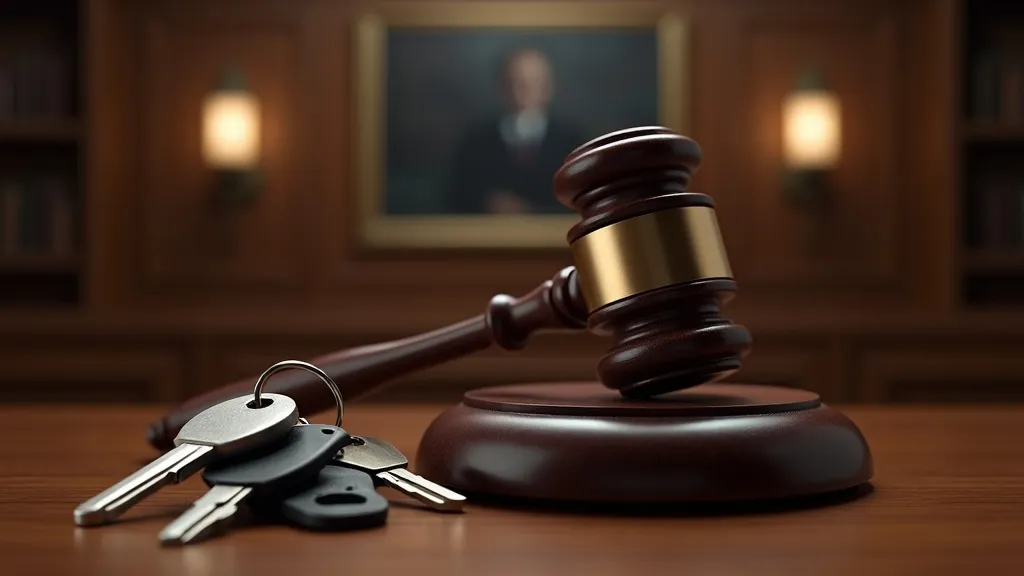Understanding Wrongful Repossession
Wrongful repossession refers to the illegal seizure of property by a lender, typically due to a breach of contract. This article delves into the complexities of wrongful repossession, examining legal perspectives, consumer rights, and the processes involved. It aims to guide readers through their rights and the steps they can take if they believe they have been unjustly treated by a lender.

Introduction to Wrongful Repossession
In the world of finance and lending, wrongful repossession is a term that sends shivers down the spine of both consumers and lenders. It refers to the unlawful seizure of an asset, often a vehicle, by a lender or their agent, without adhering to the legal protocols or when there is no legitimate ground for repossession. This article explores the intricacies of wrongful repossession, highlighting legal perspectives, consumer rights, and what one should do if they find themselves in such a situation. As financial transactions and lending practices become more complex, the potential for wrongful repossession incidents increases, making it imperative for consumers to be aware of their rights and the legal frameworks governing repossession.
The Legal Framework Surrounding Repossession
Repossession is generally permissible by law when a borrower defaults on a loan agreement. However, the process is bound by strict legal standards that lenders must adhere to. Lenders are required to provide notice of default and allow a grace period for borrowers to rectify their financial standing. Failure to follow these procedures can result in a wrongful repossession claim. The laws governing repossession can vary significantly from one jurisdiction to another, but they typically fall under the Uniform Commercial Code (UCC) in the United States, which provides guidelines for secured transactions.
The UCC stipulates that repossession must be conducted without "breach of the peace," meaning that lenders cannot use force, threats, or intimidation to reclaim the property. Additionally, lenders are often required to communicate the specifics of the default and the impending repossession clearly. This includes defining what constitutes a default, outlining payment schedules, and providing information on how the borrower may remedy the default. Understanding these legal frameworks is crucial for both consumers and lenders to avoid disputes and ensure fair practices.
Consumer Rights in Wrongful Repossession
Consumers have rights that protect them from illegal repossession practices. These rights include the right to be notified before repossession, the right to reinstate the loan or redeem the repossessed item, and the right to recover damages if the repossession was indeed wrongful. Understanding these rights is crucial for any borrower facing the threat of repossession. For example, the right to notice means that a lender must inform the borrower of their default status and any actions they plan to take before actually repossessing the item.
Furthermore, the right to redeem means that borrowers often have a specific timeframe within which they can pay off the delinquent amount and retrieve their property before it is sold at auction or disposed of. This right is particularly important because it allows borrowers to regain possession of their assets and rectify their financial situation without entering into protracted legal battles. In many states, the right of redemption can extend for a certain period after repossession, during which the borrower can reclaim their vehicle or property by paying the owed amount, including any fees incurred by the lender.
Steps to Take if You Suspect Wrongful Repossession
If you believe you have been a victim of wrongful repossession, it is important to act swiftly. The following steps can guide you through the process of addressing the situation effectively:
- Gather Documentation: Collect all relevant documents related to your loan agreement, payment history, and any communication with the lender. This may include payment receipts, correspondence via email or mail, and any notices received from the lender regarding the loan status. Having a comprehensive overview of your financial relationship with the lender will be invaluable if you need to escalate the matter.
- Consult Legal Expertise: Contact a lawyer who specializes in consumer rights or wrongful repossession cases to evaluate your situation. Legal professionals can provide specific advice based on your circumstances and help you understand the potential outcomes of your case. They can also assist in navigating local laws and regulations that pertain to repossession.
- Communicate with the Lender: Reach out to the lender to resolve the issue amicably. This might involve negotiating a new payment plan. An open line of communication can sometimes lead to a resolution before resorting to legal actions. Be prepared to explain your situation clearly and provide evidence of your willingness to rectify the default.
- File a Complaint: If the issue cannot be resolved directly, consider filing a complaint with consumer protection agencies or pursuing legal action. Many states have specific regulatory bodies that oversee lending practices and can intervene in cases of wrongful repossession. Additionally, you may also consider filing a complaint with the Better Business Bureau (BBB) or the Consumer Financial Protection Bureau (CFPB).
Potential Consequences for Lenders
Lenders found guilty of wrongful repossession can face severe consequences. These may include financial penalties, damage to reputation, and the obligation to compensate the consumer for any losses incurred. In some cases, lenders may also be required to return the repossessed property. The legal ramifications can extend beyond financial penalties; lenders may also face lawsuits that could result in significant costs associated with legal fees and settlement payouts.
Additionally, wrongful repossession incidents can lead to a loss of trust and credibility in the eyes of consumers. In an age where online reviews and social media play a crucial role in shaping public perception, a single wrongful repossession case can tarnish a lender's reputation significantly. It can deter potential customers and lead to a decline in business. For lenders, it’s essential to implement compliant policies and training for employees involved in the repossession process to minimize the risk of wrongful repossession occurrences.
Case Studies: Lessons from Past Repossession Incidents
Case studies of wrongful repossession incidents provide valuable insights into the dynamics of such cases. They highlight common mistakes by lenders and underscore the importance of adhering to legal requirements. For instance, a notable case involved a lender that failed to provide the required notice of default before repossessing a vehicle. The borrower was able to successfully challenge the repossession in court, leading to the lender being ordered to return the vehicle and compensate the borrower for damages.
Another case illustrates the complexities that can arise when a borrower is in bankruptcy. In this scenario, a lender repossessed a vehicle after the borrower had filed for bankruptcy protection, which is illegal. The court found in favor of the borrower, resulting in substantial penalties for the lender. These cases emphasize the necessity of understanding the legal landscape regarding repossession and the potential repercussions for lenders who do not comply with the law.
Furthermore, these case studies serve as a warning to consumers. They highlight the significance of keeping records of all communications and transactions with lenders and being proactive about understanding their rights. By learning from the experiences of others, consumers can better prepare and protect themselves against wrongful repossession.
FAQs
- What constitutes wrongful repossession? Wrongful repossession occurs when a lender seizes property without following legal procedures or without valid grounds. This can include failing to provide notice of default or repossessing an item when the borrower is not in default.
- Can I challenge a repossession? Yes, if you believe it was wrongful, you can challenge it by gathering evidence and seeking legal counsel. This may involve filing a lawsuit against the lender or negotiating for the return of the property.
- What are my options if my car is wrongfully repossessed? You can negotiate with the lender, file a complaint, or pursue legal action to recover your losses. Additionally, collecting evidence of wrongful practices can strengthen your case against the lender.
- How can I prevent wrongful repossession? To prevent wrongful repossession, stay informed about your loan terms, make payments on time, and communicate proactively with your lender if you encounter financial difficulties. Understanding your rights can also empower you to defend against wrongful practices.
- What should I do immediately after a repossession? After a repossession, the first step is to review your loan agreement and determine if the lender followed proper legal procedures. If you suspect wrongful repossession, gather documentation and seek legal advice as soon as possible.
Conclusion
Wrongful repossession is a serious issue that affects both consumers and lenders. By understanding the legal framework, consumer rights, and appropriate actions, individuals can protect themselves from illegal practices and seek justice if they fall victim to such incidents. Staying informed and proactive is key to navigating the complexities of wrongful repossession. Consumers should educate themselves on their rights and the processes involved in repossession to avoid future pitfalls. Furthermore, lenders must ensure compliance with the law to foster trust and maintain a positive relationship with their clients. As the landscape of lending continues to evolve, both parties must remain vigilant to prevent wrongful repossession and its consequences.
Additional Resources for Consumers and Lenders
For consumers and lenders alike, being informed is the first step towards avoiding wrongful repossession scenarios. Below are additional resources that can help both parties navigate the complexities of lending and repossession:
Consumer Financial Protection Bureau (CFPB)
The CFPB is a valuable resource for consumers seeking information on their financial rights. It provides guides on various topics related to loans, credit, and debt collection practices. Consumers can find information on how to file complaints against lenders and learn more about their rights regarding repossession.
National Consumer Law Center (NCLC)
The NCLC offers resources and publications that focus on consumer law, including detailed information on wrongful repossession. The organization advocates for consumer rights and provides legal assistance for those facing unfair practices.
State Attorney General's Office
Each state has an Attorney General's office that can assist consumers with issues related to unfair lending practices, including wrongful repossession. Consumers can file complaints and seek guidance on legal options available to them.
Legal Aid Organizations
Many communities have legal aid organizations that provide free or low-cost legal services to individuals facing financial difficulties. These organizations can help consumers understand their rights and represent them in cases of wrongful repossession.
Online Forums and Support Groups
Online forums and support groups can also provide support and shared experiences for individuals who have faced wrongful repossession. These platforms can offer emotional support as well as practical advice from those who have successfully navigated similar situations.
Final Thoughts
As the financial landscape continues to change, staying informed about wrongful repossession and consumer rights is crucial. Both consumers and lenders have a role to play in ensuring that the repossession process is conducted fairly and legally. By understanding the implications of wrongful repossession and the available resources, individuals can better navigate the challenges that arise in financial transactions, ultimately leading to a more equitable lending environment.
-
1

Explore Thrilling Adventures: Unveil the World's Very Exciting Travel Destinations
-
2

Unlock the Secrets to Maximize Your Kona SUV's Fuel Economy
-
3

Unlock the Highest Resale Profit: Expert Tips for Boosting Your Kona SUV's Value
-
4

Effortless Adaptation to Senior Apartment Living: Master the Transition with This Ultimate Strategy
-
5

Transform Your Senior Apartment into a Cozy and Charming Retreat: Personalized Touches to Make It Truly Home









